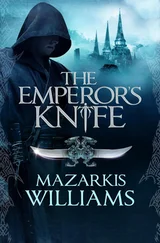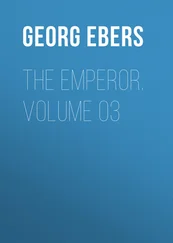T.F. Banks - The Emperor's assassin
Здесь есть возможность читать онлайн «T.F. Banks - The Emperor's assassin» весь текст электронной книги совершенно бесплатно (целиком полную версию без сокращений). В некоторых случаях можно слушать аудио, скачать через торрент в формате fb2 и присутствует краткое содержание. Жанр: Исторический детектив, на английском языке. Описание произведения, (предисловие) а так же отзывы посетителей доступны на портале библиотеки ЛибКат.
- Название:The Emperor's assassin
- Автор:
- Жанр:
- Год:неизвестен
- ISBN:нет данных
- Рейтинг книги:5 / 5. Голосов: 1
-
Избранное:Добавить в избранное
- Отзывы:
-
Ваша оценка:
- 100
- 1
- 2
- 3
- 4
- 5
The Emperor's assassin: краткое содержание, описание и аннотация
Предлагаем к чтению аннотацию, описание, краткое содержание или предисловие (зависит от того, что написал сам автор книги «The Emperor's assassin»). Если вы не нашли необходимую информацию о книге — напишите в комментариях, мы постараемся отыскать её.
The Emperor's assassin — читать онлайн бесплатно полную книгу (весь текст) целиком
Ниже представлен текст книги, разбитый по страницам. Система сохранения места последней прочитанной страницы, позволяет с удобством читать онлайн бесплатно книгу «The Emperor's assassin», без необходимости каждый раз заново искать на чём Вы остановились. Поставьте закладку, и сможете в любой момент перейти на страницу, на которой закончили чтение.
Интервал:
Закладка:
“But this inn will go up,” Westcott protested.
“We are pursuing murderers, Captain. We cannot waver.”
Morton herded his reluctant companions back to the carriage. They were some time turning it round in the madness of the innyard, but then they were out into the roadway, where men on foot and horse came hurrying to the fire.
With one backward look at the rising glow, Westcott turned the carriage onto the western road and cracked his whip over the heads of their tired team.
CHAPTER 28
At first they seemed almost unearthly, a strange dancing circle of yellowish-orange lights, bobbing in the dark emptiness of the night above him. Morton was by himself on the box, and he blinked his weary eyes a moment in confusion, the reins slack in his hands. Plymouth was still some twenty-five miles off, it was well past midnight, and all around, unseen below an overcast sky, lay the barren upland wastes of Dartmoor. It was the most deserted stretch of country he and his companions had traversed since leaving Lon-don-he had not seen lights of any kind for hours, since they had passed the lonely signal tower at the edge of the moor, its shutters motionless, a single dim lamp burning in an upper window. Now, from nowhere, a faerie circle of illumination seemed to hover and vibrate over the invisible earth.
But as he urged his team cautiously on and felt the coach begin once more to ascend, he recognised that they weren't in midair at all, but only on the brow of the next height of the Great Western Road. Drawing slowly up the slope, he could make out a little knot of men with lanterns, standing oddly across the way and blocking it. As he stopped a few yards short of them, a deep silence fell, and the crickets could be heard pulsing on all sides.
Only then did he notice the weapons-the musket barrels, the glint of blades. Too late. Several of them were setting down their lanterns, taking up their arms. Presley and Westcott remained asleep in the compartment. Morton moved his hand unobtrusively to his pistol. The sound of the men's boots on the gravel road seemed very loud as they walked deliberately up. Their stern faces loomed into the glow cast by his own coachlamps.
But when Morton saw them more clearly, he relaxed. Whatever their expression, these were country faces. Yeomen, farmers, clad in dark corduroys and fustian. He knew such weathered features and such clothes well enough; he drew his hand unobtrusively away from his weapon.
“Even to ye, zir. Ye'll be vrom London-way, expect.”
The West Country accent was unmistakable.
“Good evening to you. Aye, from London. What's the matter, then?”
Four of them had drawn up around the dusty vehicle and were gazing up at him with an earnestly appraising look. They were not quick to reply. When they did, it was the first man again, a tall, dark fellow with a fowling piece cradled, muzzle down, in the crook of his arm.
“H'a ye zeen aught amiss on the road tonight, zir?”
“Nay. Is aught amiss here?”
“Aye. There be. H'a ye zeen a great dark painted carriage? Vrenchmen, it might be. Travelling hard.”
“Why do you ask?” Morton peered at him in surprise and got a long guarded look in response. He could feel the coach sway a little on its springs as the passengers in the cabin below him shifted. Presently he heard the door open. The Devonshire men watched with steady eyes, but Morton noticed the grip on their weapons get a little tighter. They were on edge, for all their phlegmatic country manners.
Jimmy Presley clambered out into the night air, yawning, bending at the waist to stretch himself.
“Aye,” slowly resumed the tall man, watching Morton's young colleague. “Vrench zoldier-men, appears, as have broken their parole and gone off from the gaol on t'moors there by Princeton. They were zeen hereabout.”
“Aye,” said another. “The colonel at Princeton zays they've t'an horse vrom his stable, but they must've thieved a carriage from zomeone.”
“They've been zeen,” repeated one of the other men flatly.
“Like enough they'll be bound for the coast,” said another voice, at Morton's back. Geoffrey Westcott also yawned and gave a perfunctory nod of greeting to the country men. “They're a-weary of our company, I daresay. The Home Office tells us they've been wandering off all over England,” he told Morton with a wry smile. “They're trying to find passage for France, one way or another. There's smuggler folk along the coast south of here who'll be glad enough to ferry them over for a fee. I think you'll find them lost and harmless.”
The four men regarded Westcott steadily for a moment, and Morton saw, even if Westcott couldn't, that they knew more than they had said.
“Nay so harmless” was the cryptic response of the tall man.
“We're from the Bow Street Magistrate's office, in London,” Jimmy Presley announced brusquely. “We're after some other Frenchies in a dark painted coach and four-a berlin, heading westward.”
The Devon men took sober note of this and looked at one another questioningly.
“Ess, Humphrey,” one of them eventually addressed the tall man. “Here be zummut. Zir Godfrey'll want 'em, sure.”
Jimmy was impatient. “Speak up, lads! Don't mumble. Have ye seen these folk in the coach, yea or nay? They'd like have been passing along this road.”
They all regarded him another moment, unsmiling, blank. The tall man, Humphrey, cleared his throat.
“If ye be the king's men, our justice of the peace'll want ye. He's zent for. There be zummut that ye best look on.”
They would be no more specific. Humphrey went ahead on horseback, leading the carriage with the Bow Street men and their companion away from the high road and along a narrow, deeply shadowed lane overgrown on both sides by furze bushes and straggling hedgerows of thorn and briar. The way was pitted and eroded by the floods of other seasons, and their wheels rocked perilously as they jounced over it; but then the way became smoother, gravel crunching beneath the iron-shod feet of their team and beneath the wheels. Someone had repaired the lane out of sight of the main road.
Below a low stone bridge, invisible water muttered and rattled endlessly in a rocky bed. Once there came the shrill cry of a plover out of the surrounding obscurity. Then silence again, and the rank perfume of midsummer heather hanging oppressively in the muggy air.
At length the path seemed just to peter out. Their yellow lamps cast a sulphurous glow over an unkemptyard, filled with dim forms: a broken rick and other decayed and half-seen things-rusting spade, scythe handle, a heap of shattered crockery-all overrun with knapweed.
They found a decrepit barn, newly thatched, set back in a grove of scraggy trees that clung to the hillside. As the London men and their guide approached, a dark form detached itself and moved toward them.
“Lemuel?”
“Here, Maister Albright.”
A gaunt young man came into the light, a musket at port. From the familiar way he held it, Morton guessed him to be a discharged soldier.
“Zir Godfrey's not come?”
“Been, and 's gone to Ashburton for the crowner and some other volk. Come again anon, 'a zays.”
“Nought's stirred here?”
Lemuel's beardless lips formed a slight sardonic smile. “Nay,” he replied, “nor like to, 'll guess.”
Albright grimaced and gestured for the visitors to come in. As he followed, Morton's chest tightened, and he tried to prepare himself. But something about the wretchedness of this place, perched on the margins of the barren moor, something in the grim air of the men, and an indescribable charge of anxiety that seemed to hang unreleased in the very boughs of the stunted trees and in the eerily still ghost-forms of shrubbery on either side of the path, all combined to fill his fatigued mind with a deeper dread, a feeling shapeless and uncanny.
Читать дальшеИнтервал:
Закладка:
Похожие книги на «The Emperor's assassin»
Представляем Вашему вниманию похожие книги на «The Emperor's assassin» списком для выбора. Мы отобрали схожую по названию и смыслу литературу в надежде предоставить читателям больше вариантов отыскать новые, интересные, ещё непрочитанные произведения.
Обсуждение, отзывы о книге «The Emperor's assassin» и просто собственные мнения читателей. Оставьте ваши комментарии, напишите, что Вы думаете о произведении, его смысле или главных героях. Укажите что конкретно понравилось, а что нет, и почему Вы так считаете.











